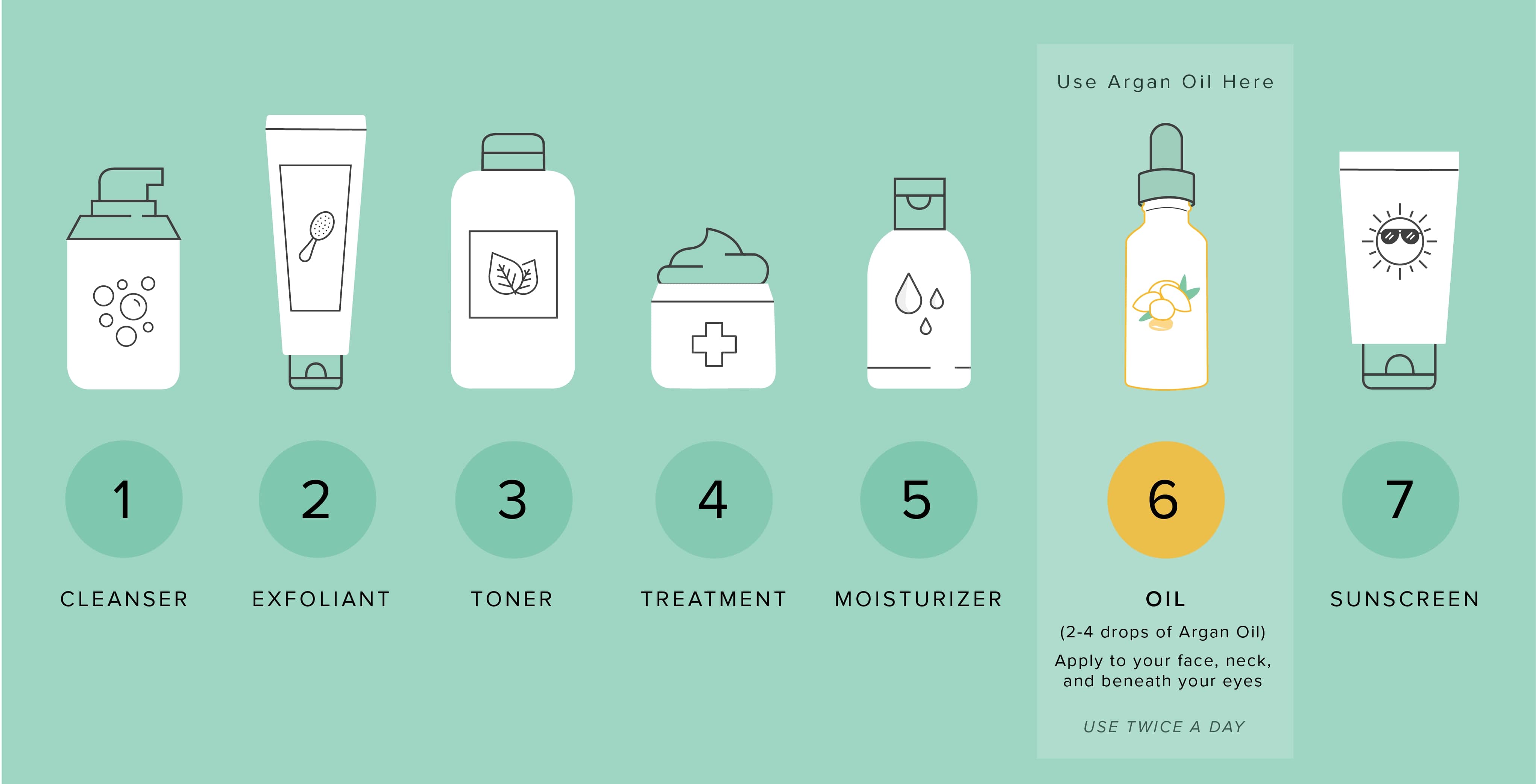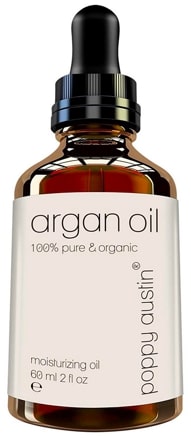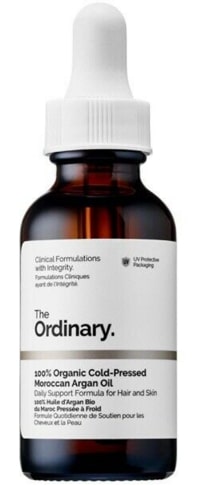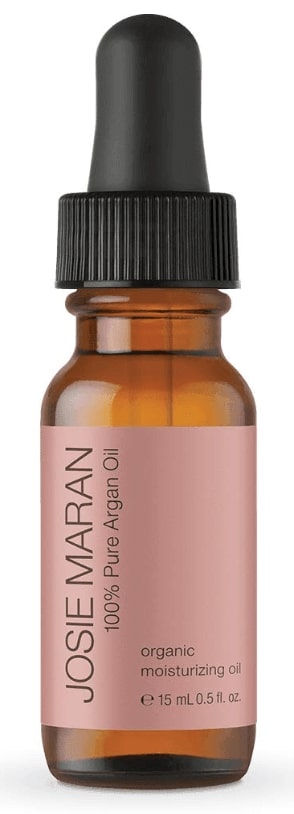Argan Oil Skin Care Benefits:
All You Need to Know
Argan oil is a popular plant oil used in both skin and hair care for its many anti-aging benefits. Derived from the nuts of argan trees in Morocco, argan oil serves up antioxidants like vitamin A and vitamin E, omega-6 fatty acids, oleic acids, and linoleic acids. Argan oil is an all-natural skin healer that locks in hydration, plumps fine lines and wrinkles, fights free radical damage (sun and pollution damage), reduces redness, and leaves the skin silky and soft.
Argan oil is also non-comedogenic (a.k.a won’t clog your pores) and after absorption, is NOT greasy. Think of argan oil as a skin balancer meaning argan oil helps retain moisture in dry skin and reduces oil production in oily skin (but if you have super oily skin, we recommend rosehip oil). All in all, argan oil is a skin healer/balancer that's anti-breakout and natural. Even better, high quality argan oil won’t break the bank.
WARNING: If you have a nut allergy, stay away from argan oil.
Argan Oil
INGREDIENT CATEGORY: Essential Oil, Emollient, Occlusives, Plant Extract
BEST FOR TREATING: Dryness, Fine Lines and Wrinkles, Redness
SKIN TYPES FOR USE: All
SAFETY: Argan oil is safe for topical use in skin care products
GHS TIP: Only buy the good stuff - that means 100% pure, organic, cold-pressed, unfiltered, and non-deodorized argan oil
Top 6 Argan Oil Skin Care Benefits
✓ Natural Anti-Aging
PREVENTS FINE LINES AND WRINKLES
Argan oil is a natural anti-aging ingredient that fights free radical damage and keeps skin hydrated. Argan oil is rich in polyphenols and antioxidants like vitamin A (retinol) and vitamin E that fight free radical damage (skin damage caused by the sun, chemicals, and pollution). By fighting free radicals, argan oil improves elasticity which slows the development of new fine lines and wrinkles, and because argan oil prevents skin from losing moisture, it reduces the appearance of existing fine lines and wrinkles. Argan oil plumps up the fine lines and wrinkles you have, and helps prevent new ones from developing.
✓ Reduces Redness & Fades Hyperpigmentation
CALMS REDNESS FOR SMOOTH COMPLEXION
Argan oil's vitamin E, vitamin A (retinol), and linoleic acid heal the skin. This triple threat reduces redness, soothes inflammation, and heals damaged skin (anything from acne and rashes to infections, bug bites, and burns). Additionally, argan oil reduces melanin production which naturally fades dark spots.
✓ Softens Skin
TREATS ROUGH, FLAKY SKIN
Argan oil is an emollient that softens and smooths the skin by binding skin cells back together. Great for rough or flaky skin. And don't worry…it's not greasy after it absorbs.
✓ Locks in Moisture
HELPS RETAIN HYDRATION
Argan oil, also categorized as an occlusive (sealer), mimics the skin's natural sebum (the oil your skin naturally produces to retain moisture), and when applied to the skin, argan oil forms a barrier that prevents moisture from escaping. Because argan oil improves the skins barrier function (prevents moisture from leaving the skin), argan oil balances hydration for all skin types—it helps dry skin stay hydrated and it helps oily skin de-grease. Argan oil is especially helpful for maintaining hydration in postmenopausal women.
BUT there’s one common misconception we need to clear up: Argan oil does not add hydration to the skin, but rather retains existing hydration in the skin by preventing moisture from leaving. Guarding hydration is equally as important as replenishing hydration to the skin—it’s no use to moisturize if the water molecules will instantly evaporate in an Irish goodbye off your face.
✓ Best for Dry Skin
HIGH IN OLEIC FATTY ACIDS
All plant oils contain both oleic and linoleic fatty acids, but different plant oils have varying concentration levels of each. Argan oil absolutely benefits all skin types, but because argan oil is high in oleic acids, it’s especially beneficial for dry skin. Oils higher in linoleic acids (like rosehip oil) are better for oily skin.
✓ Non-Comedogenic
DOESN'T CLOG PORES
Argan oil is non-comedogenic (a.k.a. won't clog pores) making it a safe choice for acne prone skin.
When to Use Argan Oil
SKIN CARE ROUTINE OPTION:
Apply argan oil after your moisturizer - use 2x a day for maximum results

How to Apply Argan Oil
Less is more
A little goes a long way with argan oil. Apply two to four drops of argan oil to your hands, and rub together. Using a gentle, circular motion, apply to your face, neck, and beneath your eyes after serums and creams.

Apply after moisturizer
You cannot hydrate your skin with argan oil alone. Argan oil forms a barrier on your skin’s surface that retains existing moisture and prevents moisture from leaving, but argan oil cannot replenish or add new moisture to the skin.
Order matters—if you apply argan oil before you moisturize, the argan oil gets in the way, and the moisturizer won’t 100% absorb into your skin. Always moisturize first (to replenish hydration), and apply argan oil after (to protect hydration). For maximum skin hydration, use a good humectant (like glycerin or hyaluronic acid) to replenish moisture, and then guard that moisture by applying argan oil after.

Follow Up With...
Argan oil does not protect from UV rays, so be sure to apply sunscreen daily!
Argan Oil in Products


Anti-Aging
Dryness
Fine Lines & Wrinkles
Redness


All Skin Types!


Creams
Moisturizers
Oils


Over the Counter
Top 3 Argan Oil Skin Care Products
We’ve put together a GHS curated selection of our favorite skin care products that contain argan oil for anti-aging, preventing dryness, and soothing redness. We only link to products that we absolutely believe in. All the products we’ve chosen are paraben-free, sulfate-free, and phthalate-free.
Use as FINAL STEP
Apply a few drops of this oil to your face and neck after you apply moisturizer in the AM or PM.
Price $
Certified: paraben-free, sulfate-free, phthalate-free, organic, cruelty-free, vegan, gluten-free
Use as FINAL STEP
Apply a few drops of this oil to your face and neck after you apply moisturizer in the AM or PM.
Price $
Certified: paraben-free, sulfate-free, phthalate-free, organic, cruelty-free, vegan, gluten-free
Use as FINAL STEP
Apply a few drops of this oil to your face and neck after you apply moisturizer in the AM or PM.
Price $$
Certified: paraben-free, sulfate-free, phthalate-free, organic, cruelty-free, vegan, gluten-free
GHS Tips
Go 100% pure
Only buy the good stuff. That means 100% pure, organic, cold-pressed, unfiltered, and non-deodorized argan oil. And don’t worry, it won’t break the bank (under $20 a bottle). Don’t buy any cheap argan oil—it won’t work as well and any additives can cause skin irritation.

Minimize stretch marks
Argan oil minimizes stretch marks by encouraging faster skin cell turnover. In the shower, exfoliate with a sugar scrub, massage argan oil on stretch marks, and rinse well. After drying off, apply 1-2 drops of argan oil on stretch marks, and let it completely absorb.

Apply to cracked heels
Cracked heels? No worries. Argan oil’s all natural vitamin E and vitamin A promote skin cell regeneration and collagen production which is great for dry toes and heels. Apply 1-2 drops of argan oil onto feet for smoother, even-colored heels.

Dewy vs. Matte finish
Argan oil applied under foundation can give you a glowing, dewy finish (not greasy, dewy). If you prefer a matte look, skip argan oil in your morning routine, and apply at night only.

Safety Tips
Argan oil is Cosmetic Ingredient Review Approved and safe for topical use in skin care products.
SIDE EFFECTS OF ARGAN OIL SKIN PRODUCTS:
- For the most part, argan oil doesn't cause negative side effects, but on rare occasions, you may see minor redness and irritation, or an allergic reaction (more likely in people with a severe nut allergy)
✓ Wear sunscreen!
✓ Look for 100% pure argan oil
✓ Safe to use around eyes
X Don't use if you have a nut allergy
X Don't use cheap versions of argan oil
FAQs about Argan Oil
Q. What is argan oil?
Argan oil is a popular plant oil that is derived from the nuts of argan trees in Morocco.
 Q. What is argan oil used for in skin care?
Q. What is argan oil used for in skin care?
Argan oil is used to treat the following skin concerns:
- Anti-Aging
- Dryness
- Fine Lines & Wrinkles
- Redness
 Q. How does argan oil benefit my skin?
Q. How does argan oil benefit my skin?The top 6 argan oil skin benefits are:
- A natural anti-aging ingredient
- Locks in moisture
- Reduces redness
- Softens the skin
- Best for dry skin
- It is non-comedogenic so it does not clog pores
 Q. What skin types is argan oil good for?
Q. What skin types is argan oil good for?Argan oil is safe to use on all skin types.
 Q. Is argan oil safe for my skin?
Q. Is argan oil safe for my skin?Argan oil is safe for topical use in skin care products.
 Q. What are common side effects from applying argan oil topically?
Q. What are common side effects from applying argan oil topically?On rare occasions some may see minor redness or irritation from an allergic reaction resulting from applying argan oil topically. Always be sure to do a patch test on your skin before applying a new product to your entire face.
 Q. Are argan oil and moroccan oil the same?
Q. Are argan oil and moroccan oil the same?Argan oil is a moroccan oil (because argan trees are from Morocco), but “moroccan oils” often contain other ingredients in addition to argan oil. Look for "100% Argan Oil” to be safe.
 Q. Is argan oil good for dry skin?
Q. Is argan oil good for dry skin?Yes, argan oil is great for dry skin because argan oil prevents moisture from leaving your face. To get specific, all skin types benefit from argan oil, but because it's high in oleic acids, argan oil is a top choice for dry skin compared to other plant oils like rosehip oil (best for oily skin) or jojoba oil (best for normal skin). BUT REMEMBER, argan oil does not add hydration to the skin—it protects existing moisture from leaving. So ALWAYS apply a moisturizer first and then argan oil second to lock in that hydration goodness.
 Q. Can argan oil be used on oily or acne prone skin?
Q. Can argan oil be used on oily or acne prone skin?Argan oil is safe to use on oily and/or acne prone skin. Why? Because argan oil won’t clog your pores (it’s non-comedogenic), and the oleic and linoleic acids in argan oil help balance the skin. This means argan oil actually reduces oil/sebum production in oily skin, and for honeys with dry skin, argan oil balances hydration loss. Argan oil works with you (whatever your skin type) to restore skin zen and equilibrium.
 Q. Is argan oil good for acne?
Q. Is argan oil good for acne?Yes, but to truly fight acne, use argan oil in combination with an FDA-approved, acne-fighting ingredient, like benzoyl peroxide or salicylic acid. Argan oil retains hydration in acne prone skin without clogging pores (it’s non-comedogenic), and the antioxidants in argan oil can reduce acne inflammation, redness, and irritation. Argan oil helps reduce oil/sebum production in oily skin, BUT you still need an acne-fighting ingredient, like benzoyl peroxide or salicylic acid, to get rid of breakouts. Think of argan oil as a way to keep your skin healthy and hydrated without triggering additional breakouts- you’ll still need the big boss ingredients to get rid of existing acne.
 Q. Can argan oil clog pores?
Q. Can argan oil clog pores?No. Argan oil is non-comedogenic with a rating of 0 on the comedogenic scale. That means no pore clogging.
 Q. Can argan oil make my skin less oily?
Q. Can argan oil make my skin less oily?Yes, argan oil can help you be less oily, but if you’re really oily, we recommend trying rosehip oil. Argan oil helps balance skin hydration regardless of skin type. So, if you have dry skin, argan oil helps lock in moisture, and if you have oily skin, argan oil helps reduce oil production. The skin often produces extra oil or sebum when it’s dry—it’s a defense mechanism to protect you from drying up into a crusty raisin. Because argan oil helps keep the skin moisturized and hydrated, argan oil has been shown to decrease oil/sebum production in oily skin types.
 Q. Can argan oil remove fine lines and wrinkles?
Q. Can argan oil remove fine lines and wrinkles?No, argan oil cannot erase existing fine lines and wrinkles, but argan oil can plump them up. This plumping minimizes the appearance of existing fine lines and wrinkles.
 Q. Can argan oil lighten skin?
Q. Can argan oil lighten skin?No, argan oil cannot lighten your skin tone. If hyperpigmentation is a top concern for you, we recommend trying a product with arbutin, azelaic acid, AHAs (i.e. glycolic acid) or vitamin C.
 Q. Can argan oil be used as sunscreen?
Q. Can argan oil be used as sunscreen?No, argan oil cannot be used as sunscreen. Argan oil fights free radical damage caused by UV rays, but cannot prevent UV damage from occurring. Always apply sunscreen daily.
 Q. Does argan oil expire?
Q. Does argan oil expire?Yes, argan oil has a shelf life—two years max. Use argan oil within six months of opening for optimal benefits (the quality does degrade over time), and always tightly seal your skin care products before storing in a cool, dark place (away from direct sunlight).
 Q. How can I tell if my argan oil has expired?
Q. How can I tell if my argan oil has expired?Argan oil should feel smooth and silky. If your argan oil feels slimy or extra thin, it’s expired. If it smells rancid, it’s done. If it starts to sting, throw it away.
 Q. What are common names used to identify argan oil on an ingredient list for skin care products?
Q. What are common names used to identify argan oil on an ingredient list for skin care products?- Argan Oil
- Argania Spinosa Kernel Oil

Related Pages
How to Treat Dryness - Causes, Treatments, & Top Ingredients
10 Best Hydrating Products for Treating Dry Skin
10 Best Cruelty-Free Products for Treating Dry Skin
How to Treat Fine Lines & Wrinkles - Causes, Treatments, & Top Ingredients
10 Best Products for Preventing Fine Lines & Wrinkles
10 Best Cruelty-Free Products for Preventing Fine Lines & Wrinkles
Want More GHS Tips?
It’ll be the best thing to ever slide into your DM's.


